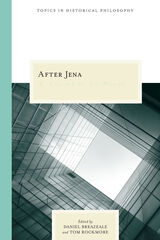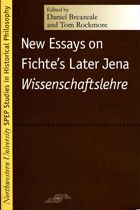
The career of J. G. Fichte, a central figure in German idealism and in the history of philosophy, divides into two distinct phases: the first period, in which he occupied the chair of critical philosophy at the University of Jena (1794-1799); and the following period, after he left Jena for Berlin. Due in part to the inaccessibility of the German texts, Fichte scholarship in the English-speaking world has tended to focus on the Jena period, neglecting the development of this major thinker's mature development. The essays collected in this book begin to correct this imbalance. Concerned in a variety of ways with Fichte's post-Jena philosophy, these essays by distinguished and emerging scholars demonstrate the depth and breadth of Fichte scholarship being done in English.
With an introduction that locates the essays in philosophical and historical terms, the book divides into three related categories: Fichte’s development, his view of religion, and other aspects of his "popular" (or not-so-popular) philosophy. From a wide range of perspectives, the essays show how Fichte’s later development reflects the philosophical concerns of his time, the specific debates in which he engaged, and the complex events of his philosophical career.


Sallis focuses on certain operations of "spacing" in metaphysics—textual lapses and leaps in which reason is displaced or suspended or abridged. In the project of establishing priority of reason, such operations can appear only in disguise, and Sallis reveals the play of imagination and metaphor that masks them. Concentrating on what has been called the closure of metaphysics, he examines texts in which the suppression of spacing would be carried out most rigorously, texts in which even metaphysics itself is seen as only an errant roaming, a spacing that must still be secured, to be replaced by a pure space of truth. And yet, in these very texts Sallis identifies outbreaks of spacing that would disrupt the tranquil space of reason. Rather than closure, he finds an opening of reason to imagination.
Sallis's reading of a metaphorical system in the Critique of Pure Reason reveals a fissuring and historicizing of what would otherwise be called pure reason. Next he traces in Fichte's major work as well as in several lesser-known texts a decentering from reason to imagination, which he characterizes as a power of hovering between opposites and beyond being. Sallis then returns to the Critique of Pure Reason to expose, in relation to the famous question of the common root of reason and sensibility, a certain eccentricity of reason. Proceeding to the Critique of Judgment, he traces a divergence of sublime nature away from that supersensible space of reason to which Kant would otherwise assimilate it—a withdrawal toward an abyss. Finally, Sallis turns to Hegel's Encyclopedia, supplementing his reading with previously unknown notes from Hegel's lectures on those sections dealing with imagination; his reading of those sections serves to expose, within the most rigorous reduction of spacing in the history of metaphysics, an irrepressible and disseminative play of imagination.
READERS
Browse our collection.
PUBLISHERS
See BiblioVault's publisher services.
STUDENT SERVICES
Files for college accessibility offices.
UChicago Accessibility Resources
home | accessibility | search | about | contact us
BiblioVault ® 2001 - 2024
The University of Chicago Press









